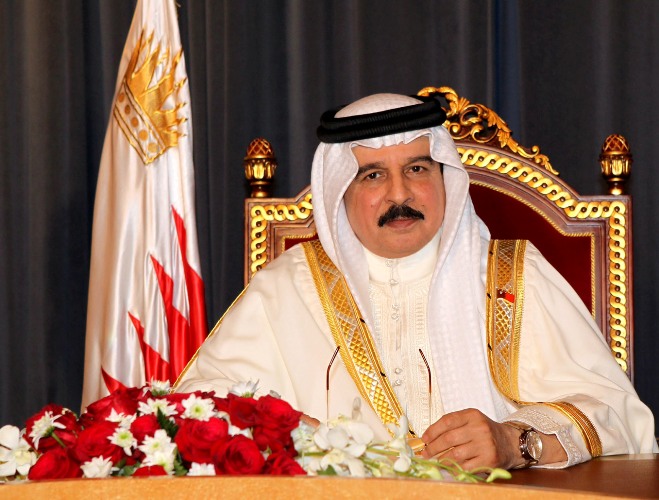 King Hamad bin Isa Al KhalifaBahrain Watch responds to Tuesday's presentation by King Hamad and the head of the National Commission proclaiming "significant and broad" reforms:
King Hamad bin Isa Al KhalifaBahrain Watch responds to Tuesday's presentation by King Hamad and the head of the National Commission proclaiming "significant and broad" reforms:
At a Royal Palace in Bahrain today, the 19-member committee appointed last November by the King presented its report evaluating the implementation of the recommendations of the Bahrain Independent Commission of Inquiry (BICI), also known as the Bassiouni Commission. Ali al-Saleh, the chairman of the committee, and King Hamad both gave speeches praising the speed of the committee's work.
That morning, around 80 students were sentenced to up to one year in prison on free-speech-related charges that the Bassiouni Commission found were used to punish the opposition.
Responding to the claims made by al-Saleh and King Hamad, Bahrain Watch noted the following:
The promulgation of a Code of Conduct and training for police officers has had no impact in stopping them from carrying out their abuses with impunity
While al-Saleh and Hamad touted police training, and the establishment of a Code of Conduct for police officers on 30 January 2012, Bahrain Watch has documented numerous ongoing abuses, with the help of activists on the ground in Bahrain. Abuses include brutal arrests and torture, improper targeting of individuals in the head with tear gas canisters, and the mass nighttime tear-gassing of residential areas, even when there are no protests. These abuses have been documented on an ongoing basis in areas all around Bahrain, suggesting that these abuses are not individual actions.
The newly formed Special Investigations Unit is not "independent and impartial" as called for by the BICI
The Attorney General issued a decision establishing a "Special Investigations Unit" housed within the Public Prosecution, in order to determine the responsibility of members in the government in relation to the cases of death and torture listed in the BICI report. While the Commission called for an independent unit, the Attorney General's decision does not require the use of independent experts. The unit is allowed to consult an "independent" advisor selected by a body chaired by the King.
Transferring investigations from the Ministry of Interior to the Public Prosecutor does little to guarantee impartiality
For months, the government has been stating that 48 police officers have been questioned in relation to 107 investigations. Meanwhile, the cases against all but one of the nine police currently on trial are based on Ministry of Interior investigations, which the BICI report found to be "in general, flawed and biased in [the Ministry's] favour." Furthermore, there are serious concerns about the independence of the Public Prosecution, given its past role in denying torture and leaking prejudicial information to the media.
Very few details about compensation mechanism; no cases of compensation yet
The government has claimed it has reformed its media policies to be inclusive of all parts of society, but little has changed since the release of the BICI report. While the most blatantly sectarian television shows have stopped airing, many websites remain blocked, including news and discussion forums, live-streaming websites, and those devoted to human rights in Bahrain. Just last week, Reporters Sans Frontieres included Bahrain in its list of "Enemies of the Internet".
The government has made relatively little progress in mosque rebuilding, and many employees are not reinstated
While the government claims it is rebuilding 12 mosques, pictures released by Bahrain's official Information Affairs Authority show tangible progress at only three sites. Residents are rebuilding demolished mosques in four other locations, in some cases with government interference. Meanwhile, as of 3 March, 1776 out of the original 4359 dismissed workers were not yet reinstated. This includes 1540 out of the original 2464 dismissed from the private sector, indicating that the government is not using all of its powers to ensure that private sector employees are treated equally to public sector employees, as recommended in 1723 (b). There are sometimes conditions attached to employees' reinstatement, such as pay cuts and requirements that they drop lawsuits regarding their dismissals. Additionally, the government has shown no indication that it intends on holding any officials accountable for the demolition of the mosques or the political dismissals.
Political prisoners still languishing behind bars
Neither al-Saleh's nor King Hamad's speech mentioned the prisoners of conscience who remain incarcerated, including a number of prominent opposition leaders who were subjected to torture, as documented in the BICI report.
In addition, founding member Bill Marczak pointed out that no mention was made in either of the speeches of holding officials accountable for the human rights crimes uncovered by the BICI report.
"For genuine truth and reconciliation, the victims, and Bahrain in general, need justice and accountability, not simply a return to the status quo prior to February 14, 2011."
"These numerous self-congratulatory commissions and reports produced by the government are far removed from what is actually taking place on the ground. The fact that not a single high-level government official or security officer has yet been held accountable for any of the ongoing human rights violations is indicative of the government's failure to address the real problems."